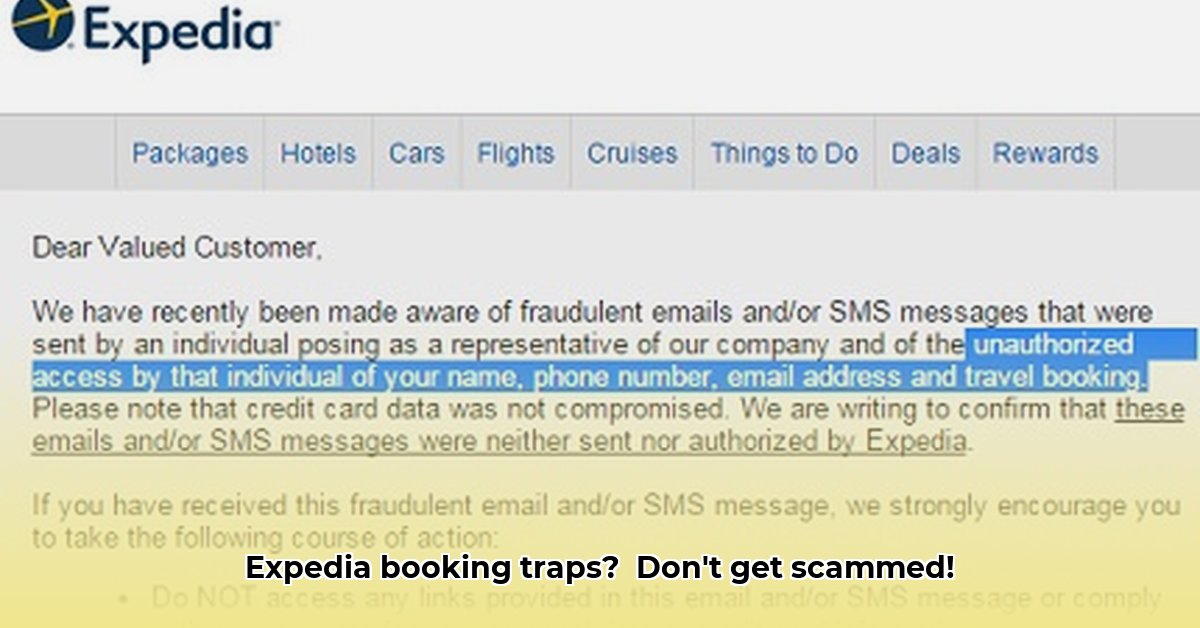
Planning your dream vacation should be exciting, not stressful. Unfortunately, scammers are increasingly using Expedia's name to defraud travelers, resulting in substantial financial losses and ruined travel plans. The Better Business Bureau (BBB) has reported a significant surge in complaints, highlighting the urgency of this issue. This guide will equip you with the knowledge and strategies to protect yourself from these scams.
Recognizing the Red Flags of an Expedia Scam
Before booking, familiarize yourself with common warning signs. These aren't always obvious, but vigilance is key.
Suspicious Communications: Be wary of unsolicited emails or texts claiming to be from Expedia, demanding personal information (credit card details, passwords, social security number) or payment via gift cards or wire transfers. Legitimate companies never request such sensitive data through these channels.
Counterfeit Expedia Websites: Fraudsters create websites mimicking Expedia's appearance. Scrutinize the URL for misspellings (e.g., "Expidia") or unusual characters. Always verify the URL is
www.expedia.combefore entering any data. Look for "https" and a padlock icon, signifying a secure connection.High-Pressure Tactics: Legitimate businesses allow time for decision-making. If you're pressured into immediate payment or information disclosure, proceed with extreme caution.
Unusual Payment Methods: Avoid requests for payment via gift cards (iTunes, Visa Gift Cards), wire transfers (Western Union, MoneyGram), or prepaid debit cards. Expedia utilizes secure payment gateways like credit cards.
Deals Too Good to Be True: Unbelievably low prices compared to other offers often signal a scam. Always compare prices across multiple reputable sources.
Did you know that a recent BBB report highlighted thousands of dollars lost to Expedia imposter scams? This emphasizes the need for increased vigilance.
Protecting Yourself During the Booking Process
Follow these steps to safeguard your travel plans:
Access Expedia Directly: Only use Expedia's official website (
www.expedia.com) or mobile app. Never click links from unsolicited emails or social media.Verify the URL: Before providing any information, meticulously check the website address for discrepancies.
Use Secure Payment Methods: Utilize credit cards offering fraud protection. These methods provide an added layer of security and facilitate easier dispute resolution for fraudulent transactions.
Independent Verification: Cross-reference hotel details (name, pictures, location) with other reputable travel sites or review platforms.
Direct Communication Only: Contact Expedia's customer service directly through their official channels for any queries or concerns. Never respond to suspicious emails or phone calls.
Report Suspicious Activity: Report any suspicious activity to Expedia immediately. They have dedicated fraud teams to investigate and prevent further victimization. Many scams are thwarted because of timely reporting by consumers like you.
Staying Vigilant After Booking
Even after securing your booking, remain vigilant:
Monitor Your Accounts: Regularly review your bank and credit card statements for unauthorized transactions. Enable fraud alerts for prompt notifications of suspicious activity.
Verify Booking Confirmation: Carefully review your confirmation email for any discrepancies, ensuring the information aligns with your expectations.
"Consumers should be proactive in protecting themselves against online travel scams," states Dr. Anya Sharma, Cybersecurity Expert at the National Institute of Standards and Technology (NIST). "Regularly monitoring accounts and reporting suspicious activity are crucial steps."
What to Do If You've Been Scammed
If you suspect a scam, take immediate action:
Contact Your Financial Institution: Report the fraudulent transaction to your bank or credit card company immediately to request a chargeback. Timely action maximizes your chances of recovery.
Report to Authorities: File a report with the Federal Trade Commission (FTC) and your local law enforcement. Gather all relevant evidence (emails, website screenshots, transaction records).
Secure Your Accounts: Change passwords for all online accounts, particularly those related to travel and finances.
By following these steps and remaining vigilant, you can substantially reduce your risk of becoming a victim of Expedia imposter scams. Remember, proactive measures and swift action are crucial to protecting your travel plans and financial well-being.